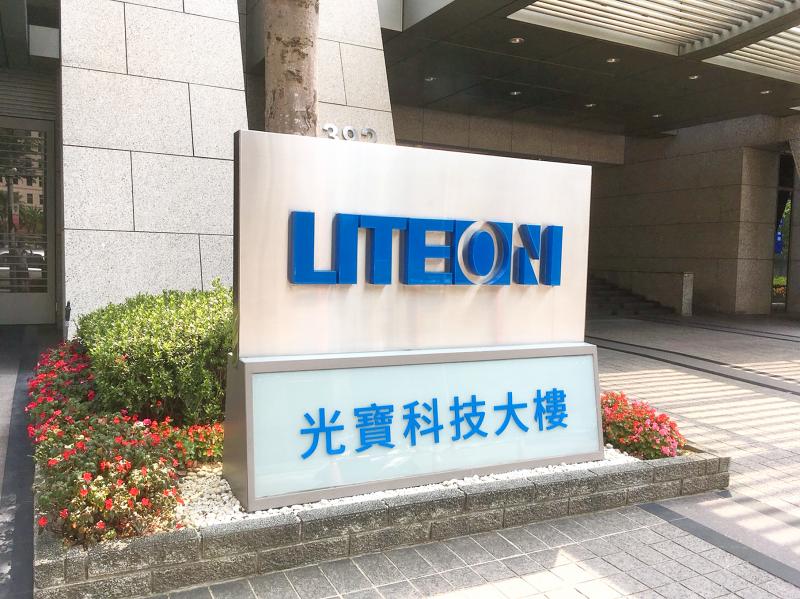Lite-On Technology Corp (光寶科技) yesterday reported its highest earnings per share (EPS) in five years for the October-to-December quarter, thanks to an improved product mix and operating efficiency, the electronic components supplier said in a statement.
The company posted fourth-quarter net profit of NT$2.51 billion (US$90.05 million), up 25 percent from a year earlier, but down 19 percent from the previous quarter on revenue of NT$44.57 billion. It was also up 8 percent year-on-year and 6 percent quarter-on-quarter.
Lite-On attributed the annual increases to steady growth in demand for products used in optoelectronics, cloud computing, 5G, artificial intelligence of things (AIoT) and automotive applications.

Photo: Chen Rou-chen, Taipei Times
EPS reached NT$1.11 in the quarter, the highest for the October-to-December period over the past five years, as gross margin and operating margin improved to 17.3 and 8.1 percent respectively, up from 16.2 and 4.4 percent a year earlier.
That brought last year’s total net profit to NT$13.89 billion, up 39 percent from 2020, with EPS rising from NT$4.31 to NT$6.01, a record, Lite-On said.
Gross margin increased 1.1 percentage points annually to 18.5 percent, while operating margin rose 1.4 percentage points to 7.9 percent, it said.
“Due to continually optimizing our product mix, improving our flexibility and response times through smart manufacturing and supply-chain management, and boosting our operational efficiency, 2021 resulted in a record profit margin and EPS,” the statement said.
Lite-On reported revenue of NT$164.83 billion for the whole of last year, up 5 percent from a year earlier.
The increase is as high as 10 percent if a business transfer in 2020 is excluded, said the company, which sold its solid-state drive business to Japan’s Kioxia Holdings Corp on July 1, 2020.
Last year, Lite-On’s optoelectronics segment contributed 20 percent of its total revenue, while the cloud computing and AIoT segment contributed 27 percent, and the information technology and consumer electronics segment contributed 53 percent.
The company continues to implement a market-oriented strategy, and expanded research and development by more than 20 percent last year, especially in optoelectronics, cloud computing, automotive electronics, and 5G and AIoT products, Lite-On president Anson Chiu (邱森彬) said.
Although its business model has shifted from original equipment manufacturing and original design manufacturing, the company aims to offer customers a systematic solution through in-house product development, Chiu said.
“Automotive electronics and 5G/AIOT products continued to obtain customer certifications in the past two years,” Chiu said in the statement. “As market momentum continues to grow, they will become the growth drivers for Lite-On.”
The company also aims to expand into smart grid solutions for household energy management in the medium to long term, creating a new growth driver, it said.

Sweeping policy changes under US Secretary of Health and Human Services Robert F. Kennedy Jr are having a chilling effect on vaccine makers as anti-vaccine rhetoric has turned into concrete changes in inoculation schedules and recommendations, investors and executives said. The administration of US President Donald Trump has in the past year upended vaccine recommendations, with the country last month ending its longstanding guidance that all children receive inoculations against flu, hepatitis A and other diseases. The unprecedented changes have led to diminished vaccine usage, hurt the investment case for some biotechs, and created a drag that would likely dent revenues and

Global semiconductor stocks advanced yesterday, as comments by Nvidia Corp chief executive officer Jensen Huang (黃仁勳) at Davos, Switzerland, helped reinforce investor enthusiasm for artificial intelligence (AI). Samsung Electronics Co gained as much as 5 percent to an all-time high, helping drive South Korea’s benchmark KOSPI above 5,000 for the first time. That came after the Philadelphia Semiconductor Index rose more than 3 percent to a fresh record on Wednesday, with a boost from Nvidia. The gains came amid broad risk-on trade after US President Donald Trump withdrew his threat of tariffs on some European nations over backing for Greenland. Huang further

CULPRITS: Factors that affected the slip included falling global crude oil prices, wait-and-see consumer attitudes due to US tariffs and a different Lunar New Year holiday schedule Taiwan’s retail sales ended a nine-year growth streak last year, slipping 0.2 percent from a year earlier as uncertainty over US tariff policies affected demand for durable goods, data released on Friday by the Ministry of Economic Affairs showed. Last year’s retail sales totaled NT$4.84 trillion (US$153.27 billion), down about NT$9.5 billion, or 0.2 percent, from 2024. Despite the decline, the figure was still the second-highest annual sales total on record. Ministry statistics department deputy head Chen Yu-fang (陳玉芳) said sales of cars, motorcycles and related products, which accounted for 17.4 percent of total retail rales last year, fell NT$68.1 billion, or

Macronix International Co (旺宏), the world’s biggest NOR flash memory supplier, yesterday said it would spend NT$22 billion (US$699.1 million) on capacity expansion this year to increase its production of mid-to-low-density memory chips as the world’s major memorychip suppliers are phasing out the market. The company said its planned capital expenditures are about 11 times higher than the NT$1.8 billion it spent on new facilities and equipment last year. A majority of this year’s outlay would be allocated to step up capacity of multi-level cell (MLC) NAND flash memory chips, which are used in embedded multimedia cards (eMMC), a managed